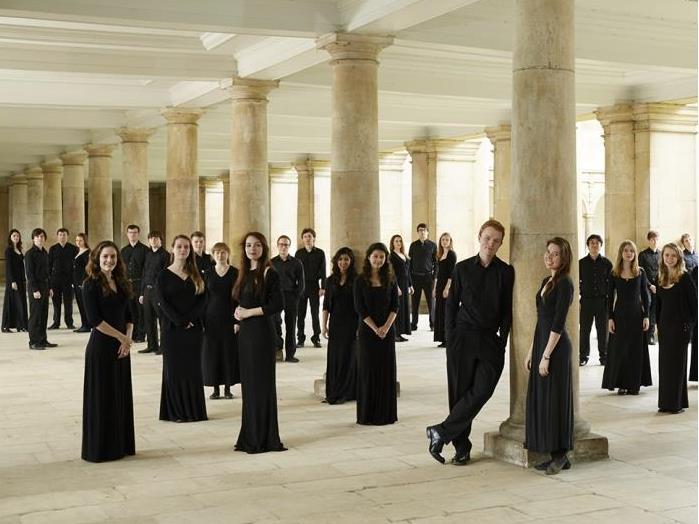As optional extras to its concert seasons of chamber music, Musica Viva Australia has for decades past toured some of England’s most famous church choirs, notably the Choirs of King’s and St John’s Colleges, Cambridge. These have been traditional affairs with boys dressed in ruffs and robes joined by male alto, tenor and bass choral scholars, their repertoire drawn mainly from the English choral tradition. So it is a welcome departure to find a tour by the all-adult Choir of Trinity College, Cambridge as part of the 2016 International Series. The choir includes female sopranos and altos and performs repertoire from all over the world including Australia, much of it from comparatively recent times. Doubtless its eclectic and vibrant artistic direction springs from the distinguished leadership of Stephen Layton, former director of the Nederlands Kamerkoor and Danish National Vocal Ensemble and well known in Melbourne for guest appearances with the Melbourne Symphony Orchestra.
As the Choir walked on stage dressed in black we noticed that there was no music in sight, and no conductor either as it commenced singing. A brief work by famous Estonian Arvo Pärt, Bogoróditse Djévo (Mother of God and Virgin) was sung with precision and clarity in Orthodox Church Slavonic. Some of the singers turned to face their colleagues, making eye contact to match their smooth vocal rapport.
Two exquisite works from the English Renaissance and one Baroque composition followed: William Byrd’s six-part O Lord, make thy servant Elizabeth (a setting of Psalm 21), Thomas Tallis’s Salvator Mundi (published as part of Cantiones sacrae in 1575) and Henry Purcell’s five-part penitential Remember not, Lord, our offences, written while he was organist and choirmaster at Westminster Abbey. This was home territory for the Choir though its sound, demonstrating obvious care, blend and pleasantly shaped phrasing was somewhat reserved and less expressive than what was to come. At this point, Layton was warmly welcomed to the stage.
The major work of the concert was in the second half of the program. Swiss composer Frank Martin’s Mass for unaccompanied double choir was written by the young composer after World War I at a time when he was travelling and developing his musical voice. An intensely private work, it remained secreted away for 40 years, with the composer insecure about its exposure to public scrutiny. The work is nothing short of a twentieth-century sacred masterpiece, inspiring and fastidiously composed. For Martin, Baroque form and technique was always an ideal, Bach his mentor. Works such as Petite Symphonie Concertante, the Harpsichord Concerto and the Passacaglia for organ all testify to a modelling on Baroque form, technique and instrumentation. Brought up the son of a Calvinist clergyman, it is unusual that he would choose the Roman Catholic Ordinary to set in 1922, perhaps further indicating the intensely personal nature of the composition. The Choir’s performance of this splendid work under Layton was exceptional; of special mention the profound Et incarnatus est de Spiritu Sancto ex Maria Virgine et homo factus est and searing Crucifixus sections of the Credo and the ecstatic Hosanna following the Benedictus.
It seemed that the other eight contemporary works on the program were somewhat overshadowed by the brilliance of the Martin in that most seemed designed for effect using barely one or two ideas which amounted to not very much. The late Steven Stucky’s boppy sacramental motet O sacrum convivium (2005) written as part of the commemoration of Tallis’s 500th anniversary seemed incongruous to its subject matter. Latvian Ēriks Ešenvalds’s The heavens’ flock, written when the composer held the quaintly titled position of ‘Fellow Commoner in Creative Arts’ at Trinity College, Cambridge, set poetry by Paulann Petersen (Poet Laureate in the State of Oregon). I admit to being no fan of Eric Whitacre’s saccharin output (described more favourably in the printed program as “eminently approachable”); i thank You, God, for most this amazing day from Three Songs of Faith set poetry by E.E.Cummings. Einojuhani Rautavaara’s Evening Hymn and Ekteniya from Vigilia (All Night Vigil) (1971) pleased for its compositional invention and original tonal vocabulary, as did Paweł Łukaszewski’s Nunc Dimittis (2007), more for its textural clarity and simple, contemplative serenity. Australian composer Joseph Twist’s brief new work Hymn of Ancient Lands (2015) commissioned for Musica Viva by Mary and Paul Pollard sets Caedmon’s Hymn in old English, Latin and contemporary English. However, it disappointed for its derivativeness and scarcity of interesting material, as did Owain Park’s emotionally naïve The Wings of the Wind (2015) setting words from Book of Psalms, though it demonstrated advanced technical proficiency and keen attention to detail.
There were two encores: a gooey arrangement of The Seekers’s The Carnival is Over and, by contrast, Duke Ellington’s snappy It don’t mean a thing if it ain’t got that swing.
It was an astonishing feat for the Choir to perform this entire recital of eclectic and sometimes difficult music from memory. On this occasion it presented as a vocal ensemble of the very first order.
Rating: 4 stars out of 5
Choir of Trinity College, Cambridge
Stephen Layton, director
2016 International Concert Season
Musica Viva Australia
Melbourne Recital Centre, Elisabeth Murdoch Hall
Tuesday 19 July, 2016
www.musicaviva.com.au





